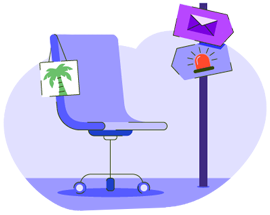Staying Secure Online, While Traveling
Being continuously connected to the Internet has its
advantages but when you are outside of your home or
office, accessing the Internet in a safe manner can be a
challenge. In this awareness message, we provide a few
tips for safely connecting to public Internet hotspots.
One of the most effective ways you can protect yourself
is to take preventive steps before you leave your home
or office. The suggestions below will provide increased
protection while traveling:
● Make sure that your
laptop is running the latest updates. By applying
software updates, you will reduce risk by mitigating
known vulnerabilities.
● Make sure the firewall on
your laptop is enabled. This helps prevent unwanted
access to your laptop over the network.
● Make sure
that your anti-virus software is up to date.
●
Laptops are targets for thieves, so be aware of your
surroundings and configure your laptop for
auto-screenlock.

If you set an out-of-the-office message, only state the duration of your absence and who to contact while you are away but do not provide specific details about your trip or the fact that you’ll be out of town. Sometimes mentioning that you are traveling can open you to the possibility of a security risk at your home. Also, utilize Outlook’s ability to limit delivery of your out-of-the-office message to recipients within your organization or to people already in your address book.
A public network is a network which is commonly available at airports, hotels, restaurants, and cafés. Be aware that when you connect to a public network, your online activities can be monitored by others and in some cases, you may connect to a fake Wi-Fi network designed to attack your system. Where available, look for signs with the name of the Wi-Fi network displayed in the hotel lobby, airport terminal or café. Using these sponsored networks provides a measure of assurance that you do not have when picking a public Wi-Fi network at random. In addition, rely on encryption such as HTTPS (SSL/TLS) to encrypt the information you send over the Web. Many websites and online services, such as Google, Gmail, Twitter, and Facebook support HTTPS encryption.
Another option is to use your smartphone as a Wi-Fi access point. If you have a smartphone, check with your service provider to see if it is possible to setup a secure “tethered connection” or “personal Wi-Fi hotspot”. Once set up, you can connect to the Internet via the smartphone 3G/4G service. By using this connection, the security afforded by your smartphone’s mobile broadband connection is a safer bet than public Wi-Fi.
Public computers are those that anyone can use and are found in libraries, hotels, and cafés. There is no way for you to know who used the computer before you and if it may have been infected with malware. Given these risks, it is advised that you limit your use of public computers to casual web browsing only, such as checking the weather, the status of your flight or catching up on the news. If you have no choice but to use a public computer to make a transaction or to communicate sensitive information, assume that any information along with your login and password has been compromised. Keep track of the accounts you accessed and change your passwords immediately the next time you have access to a trusted computer and network.